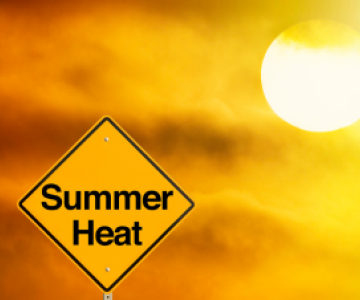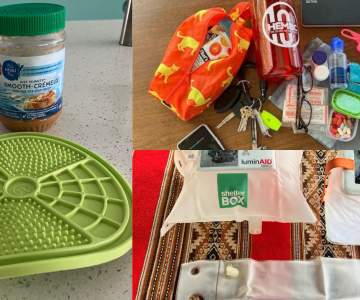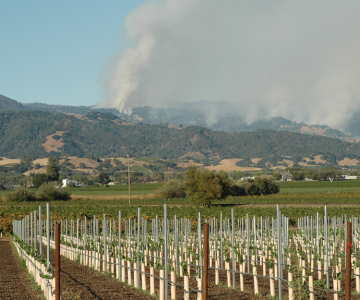Breadcrumb
Explore Stories
Health & Wellness
There's always potential for extended hot temperatures in the summer. Here's what you can do to ensure you and your family remain safe and healthy this summer.
Health & Wellness
“Preparedness is not a luxury. It’s a necessity.”
That’s the message Interior Health’s (IH) Health Emergency Management BC (HEMBC) team wants to get across to our communities as British Columbia emergency agencies prepare for another unpredictable wildfire season. And, with temperatures warming up, now is the time to review your emergency plan and take stock of your emergency kit, so you’re prepared.
While there are some fundamental items that should always live in your kit—water, food, a battery-operated or wind-up flashlight and radio, personal medications, extra keys and cash—everyone’s personal situation is unique and there are no rules for what you can or can’t add to those basic supplies.
Health & Wellness
In August 2023, with the McDougall Creek Wildfire at their doorstep, Interior Health employee Andrea, her husband and young son Ethan were ordered to evacuate their home. They were among the more than 10,000 people who had to quickly leave their Kelowna community.
When they left in vehicles crammed with all they could pack, Orca and Nelson were also on board.
Orca, a shepherd mix, and Nelson, their cat, have been beloved members of Andrea's family for 10 years. “In the chaos of leaving our home, we nearly forgot Nelson's litter box,” recalls Andrea. “It might seem insignificant during an evacuation, but there aren’t really any alternatives to a litter box for a house cat.
“This experience taught me the importance of planning ahead for our pets as well as ourselves.”
Community & Culture, Health & Wellness
If you are evacuated due to a wildfire, you’ll be anxious to return home. Officials and the local fire authority will let you know when it’s safe to do so. Your home may be impacted by smoke, soot and ash, chemicals, structural damage and water damage.
For information on evacuation alerts and orders in B.C., or to find a reception centre, visit EmergencyInfoBC or call the provincial Emergency Services Support line at 1-800-585-9559. We encourage all residents to register with Emergency Support Services online particularly if you think you could be evacuated.
For detailed information on all the topics covered in this article view IH's Returning To Your Home After Wildfires
Community & Culture, Health & Wellness
Smoky skies from wildfires can trigger anxiety or worry in children and youth, especially amidst evacuation alerts or orders. It can be hard to know how to communicate wildfire or evacuation information to children in a way that doesn’t cause them concern.
Health & Wellness
The best way to protect your health from poor air quality and wildfire smoke is to reduce your exposure and seek cleaner air.
Stay indoors: Reduce time spent outdoors to protect your health.
Reduce outdoor physical activity: Refer to the Air Quality Health Index and decrease physical exertion outdoors in when air quality is poor
Consider wearing a well fitted respirator if you cannot access cleaner air: Use a well fitted respirator (e.g., N95, KN95) properly to reduce exposure to particulate matter in smoke.
Activate medical management action plans: Ensure that your plan to self-manage any chronic diseases (e.g., respiratory and cardiovascular diseases) are in place and up to date, and that adequate rescue medications are available.
Use a home clean air shelter: Spend time in a room in your home with a portable air cleaner with HEPA filtration to reduce smoke exposure.
Health & Wellness
When a natural disaster such as a wildfire or flood strikes, people are often forced to stay in their homes or evacuate immediately.
“Everyone should make an emergency plan for their households—that includes an evacuation plan for themselves, their family members and their pets—and practice that plan,” says Anne Morgenstern, director, Emergency Response with Interior Health. “Many people feel that they will be able to throw a plan together in the moment or rely on family or other supports.
“But the reality is that these events are very stressful and dynamic and require quick decisions and actions. People can easily become overwhelmed, which can result in delays or missed information that can leave them in dangerous situations.”
Emergency preparation is particularly important for seniors, who may need extra assistance in evacuating from their residence.
Learn how you can take steps to prepare for a natural disaster or emergency evacuation. Some of the information listed below comes from Prepared BC, B.C.’s emergency preparedness education program.
“Caring for yourself and/or for a loved one can be hard - don’t let a natural disaster and evacuation add to this. Let’s be prepared,” adds Joanna Harrison, Executive Director of Seniors Specialized Care Services with Interior Health.
Read on to learn how seniors can prepare for a natural disaster or emergency evacuation. Some of the information listed below comes from Prepared BC, British Columbia’s emergency preparedness education program.
Health & Wellness
B.C. is experiencing higher annual summer temperatures and more extremely hot days. Everyone can benefit from planning and preparing for extreme heat.
Prolonged periods of extreme heat can be dangerous, especially for those who don’t have access to a cool indoor environment, or who are unhoused or unsheltered. Extreme heat can start with little warning and can build over multiple days, as we saw throughout the Interior region the past few years. Most heat-related illness occurs indoors in spaces without air conditioning.
Related Stories@IH: Summer Safety: Tips to protect yourself from summer heat
Health & Wellness
Fear and anxiety are natural reactions to stressful events such as wildfires. Here are some tips that can help you cope with the stress that wildfire season and wildfires can bring.
-
Load More
Showing 9 of 10
STAY CONNECTED
Receive news and alert posts, and Stories@IH blog posts, right to your inbox!










